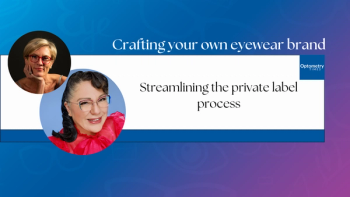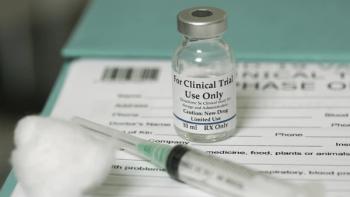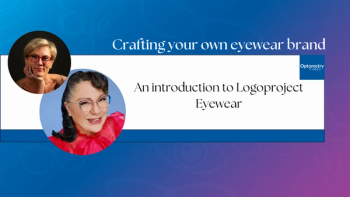
Nutrition’s role in eye care
What are some common questions our patients expect to hear from us? “How is your vision? Which is better, one or two? How many nights out of the average month do you sleep in your contact lenses?” Sure, these are the easy answers, but when is the last time you surprised your patient with a question about their diet?
What are some common questions our patients expect to hear from us? “How is your vision? Which is better, one or two? How many nights out of the average month do you sleep in your contact lenses?” Sure, these are the easy answers, but when is the last time you surprised your patient with a question about her diet? With all the information available on the benefits of vitamins and supplements, how many of us have changed our case history questions to reflect the times?
We all have patients suffering from cardiovascular diseases like hypertension, diabetes, and heart disease. We all ask our diabetic patients what their last fasting blood sugar measurement was; why not qualify this number with the food intake for the prior 24 hours?
To be proactive, patients need to be asked a few direct questions, then commit to make small lifestyle changes.
Picture this scenario: a patient goes to his doctor and finds out his cholesterol is high, putting him at risk for heart disease. Instead of recommending eating better and incorporating mild exercise into his life, his doctor has recommended a statin drug. Three months later, the patient’s cholesterol numbers are much better, but he doesn’t have the energy to get off the couch and walk around the block. This leads to the common case of “healthier blood work/unhealthier patient.” We can’t place all the blame on the physicians-after all, they’ve been talking about healthy lifestyle habits for decades, and most patients simply don’t want to listen. We’ve all been out with friends or relatives who would rather eat more now only to take an extra pill later. Breaking down these mental barriers may be futile, but impressing upon our patients the vital role their active participation plays in their own health can often times have a more positive, personal result.
Doctor’s orders: a healthy diet
The Phototrope study concluded that ubiquinone (CoQ10) combined with omega 3s and acetyl l-carnitine, can slow down or actually reverse early, dry macular degeneration1 (see Figure 1). The best way to get these is by allowing our bodies to produce the CoQ10 uninhibitedly while consuming the omega 3s and acetyl l-carnitine in a natural manner with proper food. It’s been well documented how statins, a widely-used cholesterol medication, hinder the liver’s ability to produce CoQ10, the fuel source for our cells’ mitochondria.2
Research confirms the reasons why optometrists should routinely
• Cinnamon3
• Vitamins4
• Exercise5
• Yoga6
• Meditation7
Popular television shows, like Dr. Oz, combined with the plethora of information available to anyone with an Internet connection has increased both knowledge and confusion in our patients’ minds. Their general practitioners are spending less and less time with them, and they may not feel comfortable talking to a technician about their vitamins. Chiropractors have been routinely discussing vitamins for years, but they don’t see the same demographics of patients that we do, limiting impact on the general public.
Sooner or later, we all need an optometrist. The impact we and our staffs can have on the future landscape of health care in America can stretch further than previously thought. During a 2004 meeting of the Florida Optometric Association’s Regional Board of Directors in Tampa, FL, Leonard Carlson, the former head legal counsel for the Florida Optometric Association, was asked if ODs were putting their licenses at risk for discussing vitamins with their patients. His response may surprise you: “With all the studies concluding the benefits of vitamins and supplements in relationship to eye health, my opinion is that any optometrist not discussing vitamins and supplements with their patients is putting their license at greater risk.”
References
1. Feher J, Kovacs B, Kovacs I, Schveoller M, et al. Improvement of visual functions and fundus alterations in early age-related macular degeneration treated with a combination of acetyl-L-carnitine, n-3 fatty acids, and coenzyme Q10. Ophthalmologica. 2005 May-Jun;219(3):154–66.
2. Vaughan RA, Garcia-Smith R, Bisoffi M, Conn CA, et al. Ubiquinol rescues simvastatin-suppression of mitochondrial content, function and metabolism: Implications for statin-induced rhabdomyolysis. Eur J Pharmacol. 2013 Jul 5;711(1-3):1-9.
3. Helbowicz J, Dawiche G, Bjorgell O, Almer LO. Effects of cinnamon on postprandial blood glucose, gastric emptying, and satiety in healthy subjects. Am J Clin Nutr. 2007 Jun;85(6):1552-6.
3. Seto SW, Lam TY, Or PM, Lee WY, et al. Folic acid consumption reduces resistin level and restores blunted acetylcholine-induced aortic relaxation in obese/diabetic mice. J Nutr Biochem. 2010 Sept:21(9):872-80.
5. Panza VS, Wazlawik E, Ricardo Schutz G, Comin L, et al. Consumption of green tea favorably affects oxidative stress markers in weight-trained men. Nutrition. 2008 May;24(5):433-42.
6. Howie-Esquivel J, Lee J, Collier G, Mehling W, et al. Yoga in heart failure patients: a pilot study. J Card Fail. 2010 Sep;16(9):742-9.
7. Walton KG, Schneider RH, Nidich S. Review of controlled research on the transcendental meditation program and cardiovascular disease. Cardiol Rev. 2004 Sep-Oct;12(5): 262-6.
Newsletter
Want more insights like this? Subscribe to Optometry Times and get clinical pearls and practice tips delivered straight to your inbox.













































.png)


